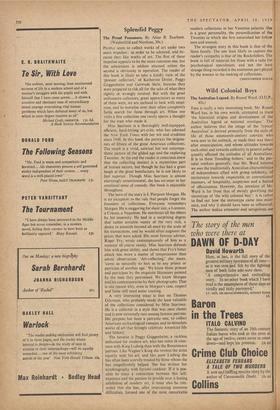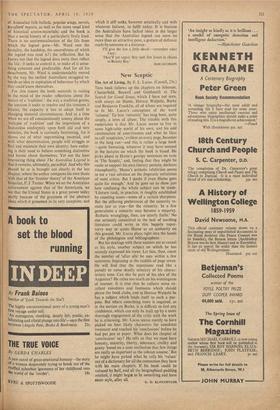Wild Colonial Boys Tins is really a very interesting book.
Mr. Russel Ward has, in his own words, attempted to trace 'the historical origins and development of the Australian legend or national mystique.' The author believes that the image of the 'typical Australian' is derived primarily from the style of life of those nineteenth-century convicts who were sent to the outback, or made their way there after emancipation, and whose attitudes towards each other and towards authority in general subse- quently affected the attitudes of all Australians. It is to these 'founding fathers,' and to the pas- toral workers generally, that Mr. Ward believes we owe the traditionally Australian characteristics of independence allied with group solidarity, of intolerance towards respectable or conventional manners, of hospitality, scepticism and a hatred of officiousness. However, the intention of M r. Ward is far from that of merely glorifying the stereotype of 'the wild colonial boy': it is rather to find out how the stereotype came into exist- ence, and why it should have been so influential. The author makes extensive and scrupulous use
of Australian folk-ballads, popular songs, novels, travellers' reports, as well as the more usual kind of historical source-materials; and the book is thus a social history of a particularly lively kind. There is no sentimentalisation of the life from Which the legend grew—Mr. Ward sees the brutality, the hardship, the uncouthness of which, the legend was (and is?) the reflection. But he ,knows too that the legend does more than reflect the life ; it seeks to control it, to make of it some- thing coherent and predictable. And for all his detachment, Mr. Ward is understandably moved by the way the earliest Australians struggled to- wards an idea or aspiration of behaviour by which they could know themselves.
For this reason the book succeeds in raising in the mind of the reader reflections about the nature of a 'tradition': the way a tradition grows, the tensions it seeks to resolve and the tensions it creates, the capacity it has to adapt itself to changing material circumstances. And at a time when we are all conscientiously uneasy about the 'collapse of tradition' and the imposition of a featureless conformity upon both old and new societies, the book is curiously heartening, for it shows out of what unpromising material, and with what determination, people will struggle to find and maintain their own identity; how endur- ing is their need to believe something distinctive and heroic about themselves. Yet not the least interesting thing about The Australian Legend is that it remains, ultimately, parochial. And why this should be so is brought out clearly in the last chapter, where the author compares his own thesis with that of the 'frontier theory' of the American historian, F. J. Turner. When we set the Australian achievement against that of the Americans, we see that the United States is a great power today Partly because of the greatness of the abstract ideas which it possessed in its very inception, and which it still seeks, however erratically and with whatever failures, to fulfil today. It is because the Australians have lacked ideas in the larger sense that the Australian legend can seem no more than an attractive pose, a gesture of defiance made by someone at a distance :
I'll give the law a little shock—remember what I say They'll yet regret they sent Jim Jones in chains















































 Previous page
Previous page